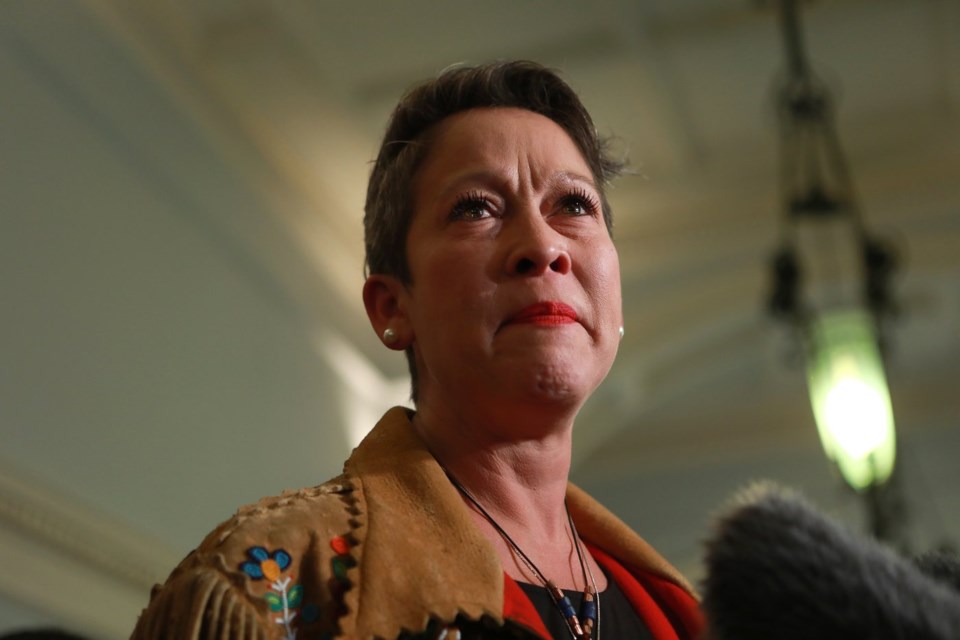VICTORIA — Can a government have a "great session" if its flagship legislation draws condemnation from a coalition of historical allies?
B.C. NDP house leader Mike Farnworth thinks so, celebrating the end of the legislature's spring sitting that culminated Wednesday night with the passage of two controversial bills that fast-track infrastructure projects, thanks to rare tiebreaking votes from Speaker Raj Chouhan.
"Yeah, Bill 14 and Bill 15 were controversial," Farnworth said Thursday after the final question period of the session.
"There were a lot of people opposed and a lot of people in favour, but we made it clear that we want to get things done in this province. The public expects us to be doing that."
The bills had become a flashpoint for the government, attracting criticism from the First Nations Leadership Council, environmentalists and some business groups.
They said the fast-track bills undermined environmental standards and constitutional obligations to consult First Nations.
Farnworth said the federal government and other provinces have been grappling with the same issues of how to expedite big projects amid a trade war with the United States.
"At the end of the day, we made it clear that these bills were going to get through, our agenda was going to get through this session and that is what happened."
To the very end, the bills came under fire.
As legislators were sitting down to vote on Wednesday night, Farnworth's former cabinet colleague Melanie Mark added her voice to the chorus.
Mark, the first First Nations woman elected to B.C.'s legislature, called the government's behaviour "astounding and disheartening" as she accused Eby and his cabinet of "turning their backs" on First Nations, local governments and environmentalists.
"Politics should not stand in the way of progressive policies," Mark said in a statement. "Trampling on Indigenous rights just ends up getting reversed in the highest courts — taxpayers will end up paying for this oversight."
Bill 14 speeds up renewable energy projects and transmission lines, while Bill 15 speeds up public and private infrastructure projects like hospitals, schools and mines.
"Former minister Mark has an opinion," Farnworth said. "The Nisga'a Nation came out very much in favour of the legislation. This is one of the things, where government makes decisions … there are going to be people who are not happy and people who are going to be happy."
The Nisga'a Nation is one of the few Indigenous groups to back the legislation.
Among the unhappy was Chief Don Tom of the Tsartlip First Nation, who declared an end to the "era of trust" with the government. Grand Chief Stewart Phillip of the Union of British Columbia Indian Chiefs called the bills "unilateralism." Terry Teegee, a B.C. Assembly of First Nations regional chief, said the bills were "regressive."
Mark said the government should reconsider the bills, saying the province had walked back plans in the past.
She pointed to a controversial $789-million plan to rebuild the Royal B.C. Museum under former premier John Horgan that the government ultimately suspended after intense criticism.
"It didn't go over as planned but former premier John Horgan had the fortitude to recalibrate, pause the project and mandate more meaningful consultation," Mark said.
Mark said Eby can do the same in this situation, which would show the government honours the Crown's duty to consult with Indigenous people.
"It’s never too late to do the right thing," she said.
But Eby said Wednesday that both bills were "critically important" because they respond to a "rapidly evolving situation."
He said B.C.'s largest trading partner, the United States under President Donald Trump, was attacking the provincial economy in the "name of annexing" Canada as the 51st state.
And Farnworth predicted British Columbians would come to see government's perspective.
"As time goes by, people will see how it's intended to work, and a lot of the fears will, in fact, be unfounded," Farnworth said.
Stewart Prest, a political science lecturer at UBC, said Eby's government seemed "hell-bent on being able to demonstrate vigorous action" to move the economy forward.
"But I think in doing so, they're placing a number potential landmines in their path," he said. While they might be able to avoid them, they are already taking a toll, he added.
Prest said the passage of the bills "fragments" Eby's coalition, mobilizing groups that had broadly supported his government to instead act against it in a "significant" way.
He said the bills could potentially pit First Nations supporting particular projects against those opposed to the government granting itself additional powers through the bills.
"We are showing those divisions show up already," Prest said, pointing to Mark's reaction.
Farnworth quoted one of the bills' critics to argue that the relationships would withstand the current furor.
"Grand Chief Stewart Phillip once said that 'reconciliation is not for wimps,'" Farnworth said. "It's not an easy road, and there will be bumps along the way, and there will be disagreements along the way. But reconciliation is a key cornerstone of our government, our party's values, and it's going to continue to be that."
Overall, the session saw the passage of 11 government bills and two private member's bills, one from the NDP, one from the Opposition Conservative Party of B.C.
Eby acknowledged that government "reduced the overall legislative agenda" during this spring session while adding more hours for debate.
Farnworth said he did not see that as a failure. "One of my key roles is to ensure, that we can come back in the fall, we have got work to do, that we have got bills ready to debate right away," Farnworth said.
B.C. Conservative Leader John Rustad was, naturally, less generous in his assessment.
"What we have seen from the government, is scrambling from crisis to crisis, and if that is what he (Farnworth) calls a great session, oh my gosh, I'm really looking forward to next spring."
This report by The Canadian Press was first published May 29, 2025.
Wolfgang Depner, The Canadian Press


